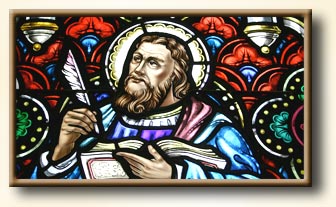|
The Church has appointed March 25th as the date for celebrating the “Annunciation of the Blessed Virgin Mary”, as the Book of Common Prayer calls it. A Collect, Epistle and Gospel are provided for this day, which is intended to be observed with a Eucharist.
The event thus commemorated is, of course, the announcement by God through the Archangel Gabriel to the young girl, Mary, that she had been chosen to bear a child that would be called “Son of The Highest,” and “the Son of God.” From this announcement and the indivisible nature of Jesus Christ as both Man and God came the Church’s decision at the third Ecumenical Council at Ephesus in A.D. 431 to recognize Mary as Theotokos, the “God-Bearer”. It is thus the account of Gabriel’s salutation, as given in St. Luke’s Gospel, combined with the decision of the Council at Ephesus, which has given us the Ave Maria, or “Hail Mary”, used as a devotional prayer.
The principal significance of the Feast of the Annunciation lies rather more in its statement of the nature of Jesus as the Incarnation of God, than in the role of Mary. But the story does convey a striking and beautiful lesson in humility and obedience. God chose Mary to bear his Son. But she had the choice of refusal. She was bewildered and awestruck. Nevertheless, she submitted herself unhesitatingly to God’s will: “Behold the handmaid of the Lord, be it unto me according to thy word”.
Saint Mary is unduly neglected by many Anglicans. Her choice by God to be the bearer of the God-Man sets her apart in a special place of honor, separate from and above that of any other saint. Her life was blameless. Her motherhood, as far as we know it, was perfect. Her understanding of and devotion to her Son was as complete as was possible for a human mother. She merits our full love and veneration. Her prayers on our behalf must powerfully ascend to the throne of God.
In some parts of the Church Catholic, an exaggerated and extreme cult has developed around the name of this blessed Saint. Anglicanism demands that we respect her and give her primacy of honor among the saints but Anglicanism has never accepted as revealed doctrine some of the extremes accepted elsewhere. An Anglican is free to believe or not to believe that Mary was ever-virgin; Scriptural evidence may be read in different ways in this matter. An Anglican is free to believe or not to believe that Mary was bodily assumed into heaven; there is no Scriptural evidence that she was so assumed. Anglicanism is silent on the contention that Mary was herself immaculately conceived, so as to be free of all original sin; there is no Scriptural evidence whatever on this point. And Anglicanism does not accept Mary as a mediatrix for us; the Prayer for the Whole State of Christ’s Church ends in the name of Jesus Christ, “our only Mediator and Advocate”.
For an Anglican, nothing more needs to be believed but what is clearly set forth in the Holy Scriptures, that Mary was a Virgin, honored by God over all other women of all times, by being chosen to bear the Son of God. This is more than ample reason to pay her great respect and honor, without inordinate extremism but also without apology and without stint.
|



